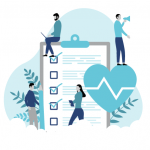Working from Anywhere? Here’s Why Your Company Should Worry
August 27, 2024

Since the pandemic, remote work has become a global phenomenon, with more people than ever working from their dream locations. Plus, companies and professionals are loving the boost in productivity and work-life balance. Whether it’s working from a sunny beach with a coconut drink or a cozy coffee shop with the aroma of freshly brewed coffee, the digital nomad lifestyle is now a reality.

But picture this: just as you’re enjoying this perfect setting, an unexpected alert pops up on your screen, or your laptop slows to a crawl, and suddenly, the idyllic scene is disrupted by a looming threat you hadn’t anticipated. What could go wrong while tethering to public Wi-Fi or handling sensitive work tasks in such an open environment? The truth is, behind this scenario lurks a growing menace—cybersecurity risks.
Disclaimer: Please note that the information provided herein offers guidelines only. It is not exhaustive and does not constitute legal, insurance, or cybersecurity advice. For more guidance, please consult a lawyer, a licensed insurance representative, and/or a cybersecurity specialist.
The Risks You Didn’t See Coming
Not everything about working from a sunny beach is all sunshine and seashells, especially when it comes to cybersecurity. Based on Acronis’ research from 2020, more than 80% of global companies admitted they weren’t prepared to switch to remote work, leading to outdated tech and weak security that exposed them to increased risks and disruptions. In fact, cybercrime has become the world’s third-largest economy after the US and China, with costs projected to hit $10.5 trillion USD by 2025, according to the World Economic Forum and Cybersecurity Ventures. Here are some of the leading risks:
1. More Ways for Hackers to Get In
With the convenience of remote working, hackers now have more opportunities to exploit vulnerabilities. Without the centralized protection of a business network, your personal devices, like PCs and laptops, are now gateways for cybercriminals. Imagine your laptop as a weak link; without proper encryption or data protection, hackers can access sensitive info, leading to potential breaches and data theft.
2. Weak Security on Personal Devices
With many companies now encouraging Bring-Your-Own-Device (BYOD) policies, personal devices have become a big part of our work-from-home setups. But these devices often don’t have the strong security features of company-issued equipment. Plus, employees might miss or put off important security updates, leaving them open to attacks. For industries with strict security needs, like healthcare and finance, relying on basic consumer protections just isn’t enough and can be quite risky.
3. Passwords: The Hidden Weakness
Human error is another risk and poor password security is one of the main culprits. If employees use the same password everywhere, it’s like giving hackers a master key to all accounts. This can lead to data breaches that harm not just the individual but also the company’s reputation and finances.
RELATED: The Top 5 Risks to Password Security
4. Public Wi-Fi: A Hacker’s Playground
Public Wi-Fi networks—found in places like coffee shops and airports—are another hazard. These often unsecured networks make it simple for hackers to intercept data. In a business network, IT manages security centrally, but working from various locations means using personal devices that might not always be secure. A common trick is the “evil twin” attack, where hackers set up a fake network that looks real. When users connect, their data can be stolen, leading to a platter of security breaches and losses.
5. VPN: A Must-Have for Remote Security
Many companies provide VPNs to secure remote work, but not everyone uses them consistently. Working without a VPN on an unsecured network increases the risk of data breaches. Ensure you’re connected to your company’s VPN whenever accessing sensitive information to maintain security.
6. Physical Risks of Working Remotely
When working from various locations, there’s a higher risk of losing a device or having it stolen. If your laptop or phone falls into the wrong hands, it could lead to unauthorized access to your sensitive data. This can mean a lot more than just losing a device—it might result in data breaches, identity theft, or exposure of confidential information, potentially causing significant harm to both your personal and professional life.
PRO Tips: What Can You Do?
You don’t want your silent vacation to cost you a fortune. Here are some simple tips to help you enjoy your freedom to work from anywhere without getting swept away by cyber threats.
1. Secure Your Connections
When you’re working remotely, make sure your internet connection is secure. Use a Virtual Private Network (VPN) to encrypt your connection and keep your data safe from prying eyes. A VPN encrypts your internet connection, making it much harder for hackers to intercept your data. It’s like having a secret passageway that shields you from prying eyes.
2. Keep Your Devices Updated
Regular updates are crucial for keeping your devices secure. Software updates often fix security holes that hackers might exploit. Make sure your operating system, apps, and antivirus software are always up to date. You can also enable automatic updates to help you stay on top of things.
3. Use Strong, Unique Passwords
Avoid using the same password for multiple accounts and skip obvious choices like your name or birthday. Instead, create strong passwords by mixing letters, numbers, and symbols. To keep track of all your passwords, use a password manager. It helps you generate and store complex passwords so you don’t have to remember them all.
RELATED: Password Management: 10 Tips to Break Bad Habits
4. Enable Multi-Factor Authentication (MFA)
Multi-factor authentication (MFA) adds an extra layer of security by requiring more than just a password to access your accounts. Even if someone gets hold of your password, they won’t be able to log in without a second verification step, like a code sent to your phone or an app. This makes it much harder for hackers to gain access, providing crucial protection against unauthorized entry.
RELATED: Multi-Factor Authentication: Why Passwords Aren’t Enough Anymore
5. Avoid Storing Sensitive Information on Mobile Devices
While it’s convenient, storing sensitive company information on mobile devices can be risky. Consider using encrypted cloud storage or secure remote access solutions. Many devices and apps offer built-in encryption for added security. For example, Windows 10 provides Device Encryption when set up with a Microsoft account, and iOS and macOS automatically encrypt data. Check your settings to confirm encryption is enabled.
And if you must keep corporate data on your mobile device, consider de-identifying it to remove personal details like names and phone numbers, reducing the risk of privacy breaches.
6. Get Cyber Insurance
Even with the best precautions, there’s always a risk of cyber incidents. Having Cyber Insurance is crucial for protecting you or your business from the fallout of a data breach or cyberattack. A solid Cyber Insurance in place can help cover costs like legal fees, data recovery, and even potential loss of income.
Some more coverage highlights include:
- A specialized data forensics team to investigate the cause of the breach;
- A legal breach coach to advise you on response and regulatory compliance;
- Client notification and credit monitoring for affected parties;
- PR consulting services to manage reputational harm;
- And more!
RELATED: All About Cyber Insurance: What is it, What’s Covered, and Why Do You Need it?
7. Work with a Broker for Cyber Insurance
But, there’s a catch. Not all Cyber Insurance will suit your individual needs. Some policies might have exclusions that could leave you unprotected against certain types of breaches or risks. Others might limit coverage to specific regions, so if your business operates internationally, you’ll need to make sure your policy covers breaches no matter where they occur.
Working with a licensed insurance brokerage like PROLINK can help you find the right coverage that truly works for you. With over 40 years of expertise, we’ll take the time to understand your business and provide you with a comprehensive plan that fits your professional needs and, of course, your budget. We’ll also help you navigate exclusions and ensure your policy provides the worldwide coverage you might need, so you’re fully protected, no matter where a breach happens.
While working from anywhere offers incredible freedom, it’s crucial to understand these risks and take steps to remain vigilant about cybersecurity risks. Having Cyber Insurance is all about adding an extra layer of security, and connecting with an insurance broker can offer you peace of mind. Remember, the digital world is as exciting as it is risky—stay smart, stay safe, and don’t let the seagulls catch a bite from your plate!
To learn more, visit our Cyber Security & Privacy Breach Tool Kit and connect with PROLINK today!
PROLINK’s blog posts are general in nature. They do not take into account your personal objectives or financial situation and are not a substitute for professional advice. The specific terms of your policy will always apply. We bear no responsibility for the accuracy, legality, or timeliness of any external content.




